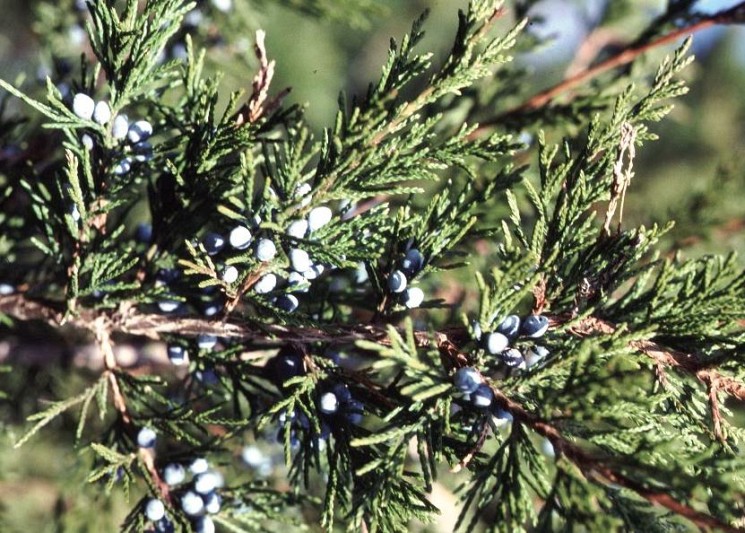Juniperus

Like the waxwings in the juniper,
a dozen at a time, divided, paired,
passing the berries back and forth, and by
nightfall, wobbling, piping, wounded with joy.
-Stanley Plumly
The genus Juniperus is the world’s most widespread member of the cypress family, Cupressaceae. Taxonomists currently debate whether to classify fifty-two or up to sixty-seven species, distributed throughout the northern hemisphere and in Africa, south of the equator. Thirteen species are native to the United States. Their shapes vary from large landscape specimens, columnar trees, various-sized shrubs, to prostrate groundcovers. Foliage color found in these evergreen conifers ranges from green and yellow to blue and silvery blue.
Junipers have two types of leaves: young growth is single needle-like up to 1/4 inch long while older leaves are shorter and scale-like occurring in opposite pairs tightly pressed to the stem. Many junipers are dioecious, which means that seed bearing cones are only found on female plants. These small, pea-sized modified cones have soft, fused scales and when ripened appear bluish and berry-like with one or two seeds inside. Juniper seeds are the preferred food of cedar waxwing, pine and evening grosbeak, purple finch, yellow-rumped warbler, eastern bluebird, mockingbird and robins but also eaten by hermit thrush, common flicker, mourning dove, cardinal and many others. The yellow-bellied sapsucker favors juniper sap. The dense evergreen foliage also provides protective nesting for many birds.
Cultivated varieties of four juniper species are growing here at Mount Auburn. Juniperus virginiana, Eastern Red Cedar and Juniperus horizontalis, Creeping Juniper represent North America, Juniperus sabina, Savin Juniper is native to Europe and Juniperus chinesis, Chinese Juniper is from Asia. Juniperus virginiana, known to many as Eastern Red Cedar is a prime example of occasional confusion caused by common names of plants. This is not a true cedar, which is in the genus Cedrus (a lovely tree to be discussed another time). Juniperus is not even in the same family (Pinaceae) as true cedars. Nonetheless Juniperus virginiana, native to eastern and central United States was during Colonial times an economic commodity of export and domestic use. Its wood that shrinks little and is somewhat resistant to decay was used for shingles, pails, buckets, tubs, fence posts, railroad ties, coffins, and other objects that came in contact with soil and/or water. During nineteenth century America most pencils were made from this wood which did not splinter when sharpened. Henry David Thoreau (1817-1862) spent many days working with juniper wood in his family’s pencil factory in Concord, MA.
With its upright spire-like habit and evergreen boughs that could be thought to represent life eternal junipers were often planted in country cemeteries in the eighteenth and nineteenth centuries. In our time it was the controversial author and essayist Edward Abbey (1927-1989) who wrote in Desert Solitaire “If my decomposing carcass helps nourish the roots of a juniper tree…- that is immortality enough for me.”
With over 450 cultivated varieties of junipers to choose from Mount Auburn displays some of the following:
Juniperus virginiana ‘Grey Owl’ – a relatively compact form 2′ to 4′ high with soft foliage that tends toward silver color
Juniperus horizontalis ‘Plumosa Compacta’ – a spreading groundcovwer reaching only 18 inches high with grey-green summer foliage that turns a light purple in winter
Juniperus sabina ‘Tamariscifolia’ – grows 18 inches tall and spreading to 10′ wide with bluish-green leaves
Juniperus chinensis ‘Spartan’ – an upright columnar or pyramidal form up to 20′ high.
We welcome you to take a closer look at our junipers on your next visit to Mount Auburn.
*This Horticulture Highlight was originally published in the February 2010 issue of the Friends of Mount Auburn electronic newsletter.
Leave a Reply